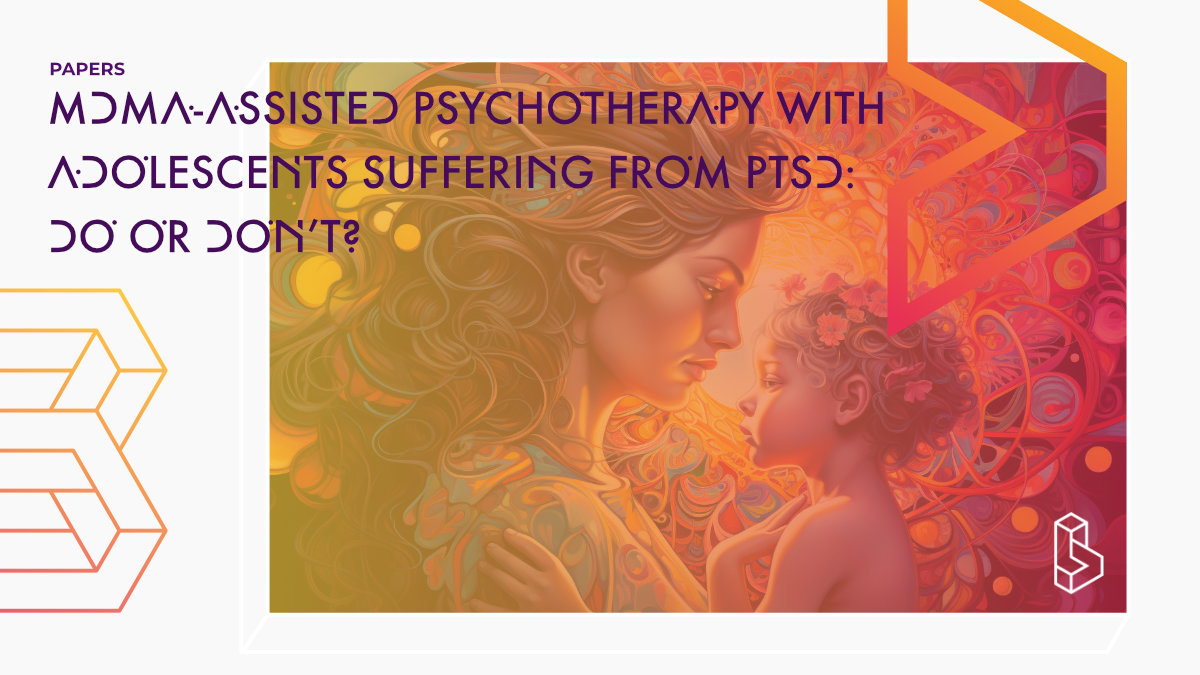This focus group study (n=19) investigated the perspectives of adolescents, parents, and clinicians on MDMA-assisted psychotherapy for adolescents with PTSD. Initial attitudes towards MDMA were mainly unfavourable, but after an explanation of the therapy, all but one participant supported its potential use, emphasizing the importance of research.
Abstract of MDMA-assisted psychotherapy with adolescents suffering from PTSD: Do or don’t?
“Background PTSD in adolescence causes much suffering and has substantial health-care costs. Many patients with severe PTSD do not respond to psychotherapy or continue to have symptoms despite trauma-focused psychotherapies and psychopharmacological treatment. A recent alternative in the search for cost-effective treatments for PTSD in adults is 3,4-methylenedioxymethamphetamine-assisted psychotherapy (MDMA-assisted psychotherapy). However, no research has yet been conducted on the therapeutic potential of MDMA for adolescents.
Aims of the study The purpose of this study is to investigate the perspectives of adolescents, parents, and clinicians about the possible clinical application of MDMA-assisted psychotherapy for adolescents with PTSD.
Method We performed focus groups in three samples: (a) 16–24-year-olds who had undergone trauma therapy (N = 9), (b) parents of traumatized children (N = 4), and (c) trauma clinicians (N = 6). Focus group topics included: perception of and associations with MDMA, opinions on MDMA-assisted psychotherapy, risks/benefits, and precautions to take prior to possible adolescent clinical trials with MDMA-assisted psychotherapy.
Results In all groups, initial participant attitudes towards MDMA were predominantly unfavorable, except for several adolescents who had conducted preliminary research on the subject. After a standardized explanation of MDMA-assisted psychotherapy, provided in each group, all but one participant changed their minds and supported the idea of implementing MDMA-assisted psychotherapy for adolescents. They all emphasized the importance of conducting research first.
Conclusion Our findings suggest that when provided with information on what MDMA-assisted psychotherapy entails, adolescents, parents, and clinicians are open to the idea of exploring this type of treatment for adolescents.”
Authors: Anoek S. van Vugt, Josjan Zijlmans, Ramon Lindauer & Levi van Dam
Summary of MDMA-assisted psychotherapy with adolescents suffering from PTSD: Do or don’t?
Post-traumatic stress disorder (PTSD) is a public health issue that causes suffering and increases healthcare expenses. It is associated with four symptom clusters: intrusive re-experiencing of traumatic experiences, avoidance symptoms, negative changes in cognition and mood, and hyperarousal symptoms.
Evidence-based psychological therapies can often effectively treat adolescents with PTSD symptoms. TF-CBT and EMDR are equally effective in reducing trauma symptoms, but both are not more effective than other treatments.
13 – 36% of adolescent psychotherapy patients drop out before the completion of treatment. Some patients who complete treatment respond inadequately to psychotherapy and may be prescribed medication, but SSRIs do not outperform placebo in adolescents. Psychological therapies are ineffective for adolescents suffering from complex PTSD, and novel treatments are needed for those who do not show improvements after receiving treatment and medication.
Find this paper
https://doi.org/10.1177/20503245231198477
Open Access | Google Scholar | Backup | 🕊
Cite this paper (APA)
van Vugt, A. S., Zijlmans, J., Lindauer, R., & van Dam, L. (2023). MDMA-assisted psychotherapy with adolescents suffering from PTSD: Do or don’t? a qualitative study with youth, parents, and clinicians. Drug Science, Policy and Law, 9, 20503245231198477.
Study details
Compounds studied
MDMA
Topics studied
Adolescence and Psychedelics
PTSD
Study characteristics
Interviews
Qualitative
Participants
19
Humans

